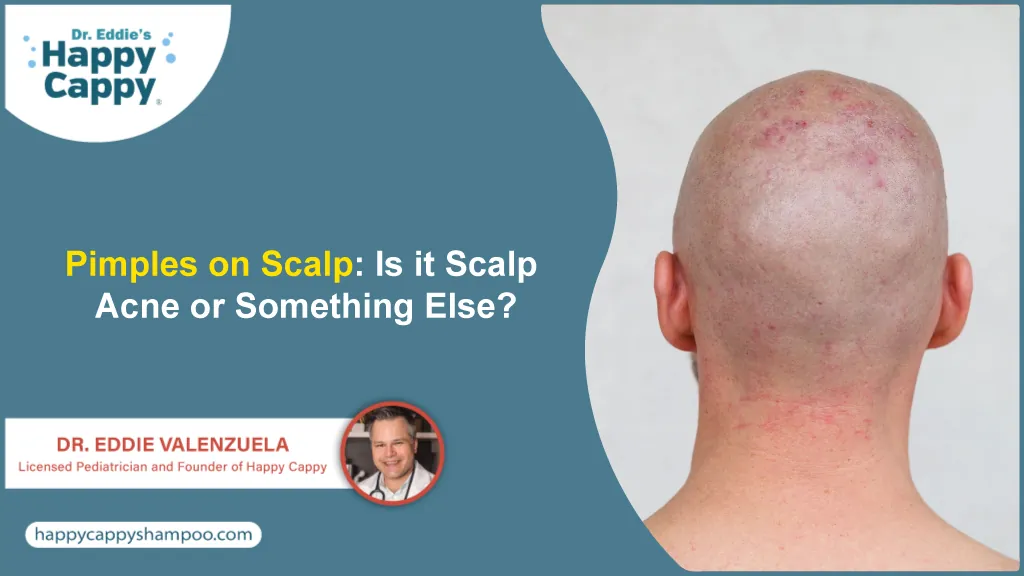
But what if you start noticing pimples on your scalp?
While many scalp bumps are caused by acne, several other skin conditions can create similar pimple-like lesions. Understanding the difference is the first step toward getting the right treatment.
In this guide, Dr. Eddie breaks down the most common causes of scalp pimples and how to treat them effectively.
Disclaimer: This article is intended for informational purposes only and is not a substitute for professional medical treatment.
Can You Get Pimples on Your Scalp?
Yes, you can get pimples on your scalp. The scalp is also a part of your body and skin, and it contains sebaceous glands and hair follicles that can get clogged and lead to pimples. You can experience different types of acne, such as
- Whiteheads (closed comedones)
- Blackheads (open comedones)
- Pustules and papules
- Pus-filled bumps
Some other common symptoms that you may experience along with the small bumps on your scalp are:
- Itchy scalp
- Red rash
- Scaly patches
- Scabbed sores
Pimples and scabs on scalp can be painful at times, making it difficult to shampoo, brush, or sometimes even touch your scalp. That is why seeking the right treatment early can help relieve the symptoms and prevent future flare-ups.
Pictures of Pimples on Scalp
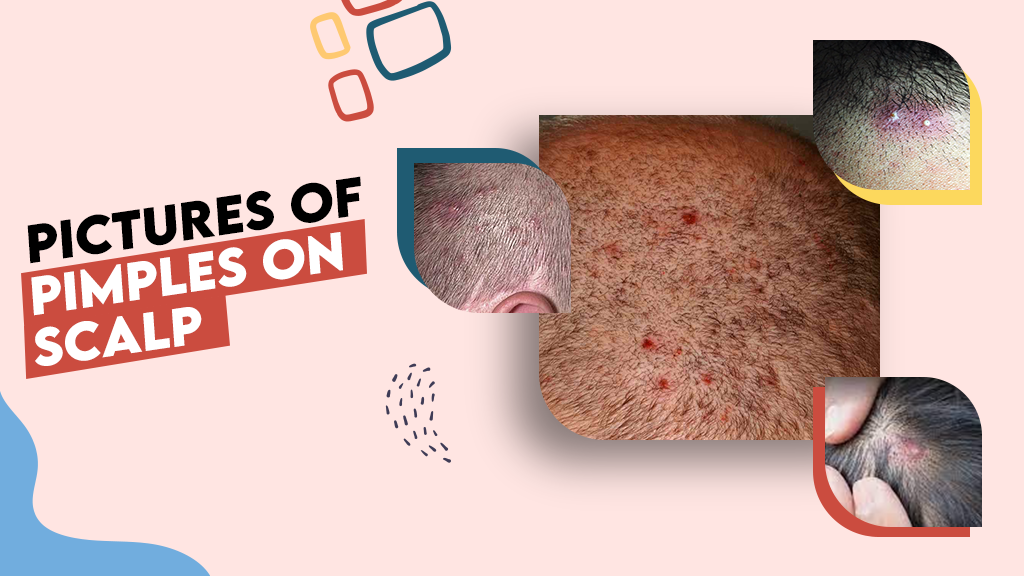
Here are a few pictures of pimples on the scalp to help you understand what they might look like. However, the appearance of these zits may vary a little depending on the root cause.
What Causes Pimples on Scalp?
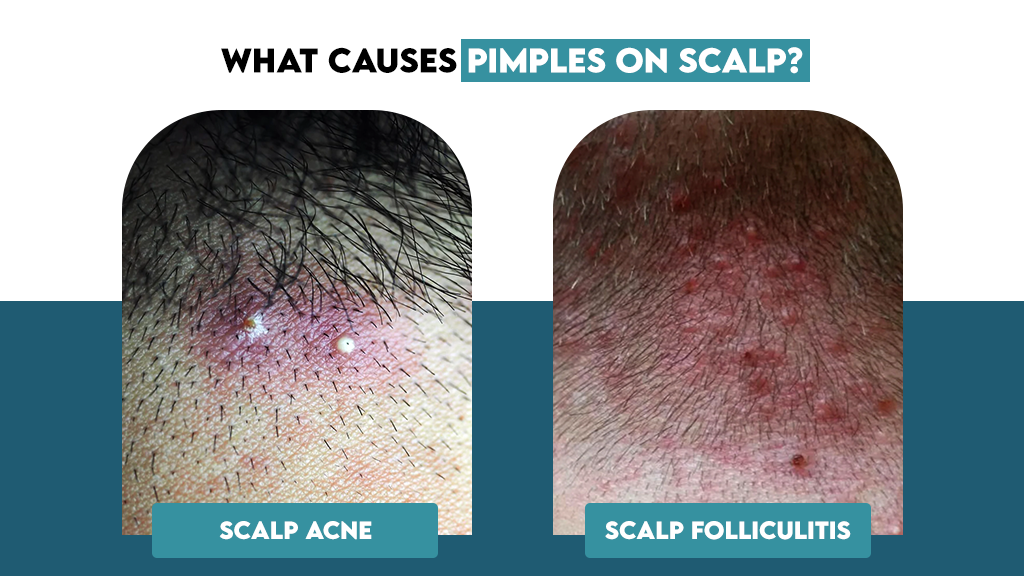
Two of the most common causes of pimples on scalp are:
1. Scalp Acne
Scalp acne is when you experience breakouts due to clogged pores or hair follicles, due to
- Excess sebum
- Sweat
- Dead skin cells
- Bacteria
- Hair product buildup
It is more common among adults, and some other common symptoms associated with it are.
- Itchy skin
- Pus-filled bumps
- Pain and soreness
- Inflammation
- In severe cases, you may also notice hair loss and scabbing around the pimples.
One of the most common types of acne experienced on the scalp is acne cosmetica. This type of acne is caused when an ingredient in hair care products like hair sprays, shampoo, conditioners, styling gel, and waxes clogs the pores and leads to breakouts.
Treatment
- Mild cases of scalp acne can be treated at home with the help of an OTC medicated shampoo for pimples on scalp.
- For severe cases, the doctor may prescribe the use of antibiotics, Oral isotretinoin, and antihistamines to reduce the severity of symptoms.
2. Scalp Folliculitis
It is a skin condition caused by an infection in the hair follicles. It can appear anywhere on the body except for the palms and soles.
The hair follicles on the scalp can become infected due to the presence of
- Bacteria
- Yeast
- Mites
- Ingrown hair
As a result, you experience painful pimple-like bumps on scalp that may vary in size.
The condition is also known as acne necrotica miliaris and Proprionibacterium folliculitis. These pimples are usually very itchy, making it hard at times to resist the itch. However, scratching can cause them to become sore and crusted, further worsening the conditions.
Treatment
- Wash the scalp regularly with an anti-fungal shampoo containing ingredients like ketoconazole (OTC) and ciclopirox (prescription).
- In severe cases, the dermatologist may prescribe the use of antibiotics and oral isotretinoin, along with the use of shampoo.
Apart from scalp acne and scalp folliculitis, there are various other conditions that can cause pimples on the scalp.
Other Conditions That Can Look Like Scalp Pimples
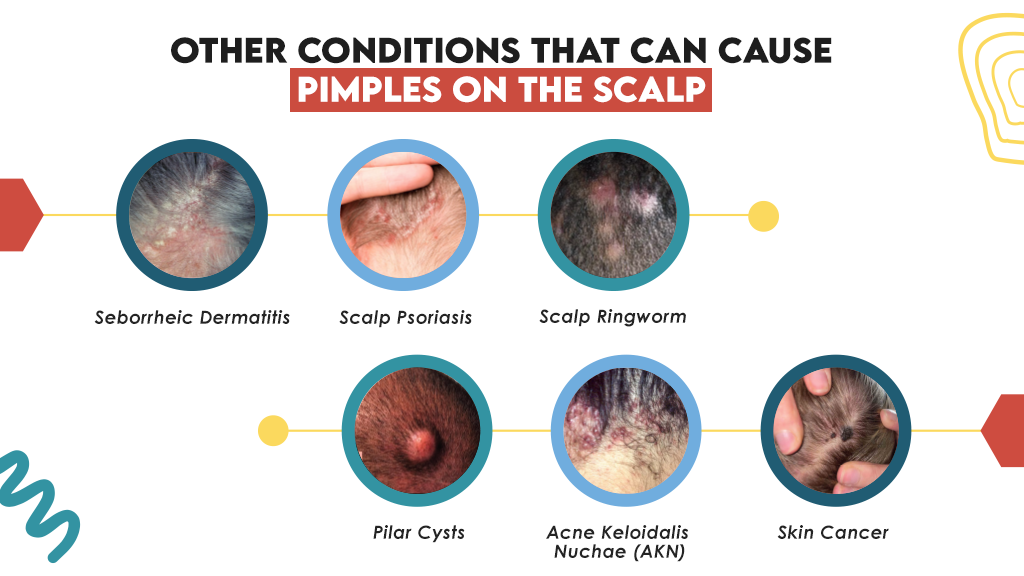
Apart from scalp acne and scalp folliculitis, there are various other conditions that can cause pimples-like bumps on the scalp.
1. Seborrheic Dermatitis
Seborrheic dermatitis is considered a more severe form of dandruff. When seborrheic dermatitis appears in babies, it is known as cradle cap. It can causes
- Flakes and scales on the scalp
- Redness
- Inflammation
- Itchy skin
Severe cases of seborrheic dermatitis can cause raised scaly patches that may look quite similar to pimple-like bumps, and scratching them can lead to bleeding, irritated skin, and skin infections.
Treatment
Even though there is no permanent cure for seborrheic dermatitis, it can be managed at home.
- Use of a medicated seborrheic dermatitis shampoo that contains active ingredients like zinc pyrithione to cleanse the scalp at least 2 to 3 times a week.
- For severe cases, the doctor may prescribe the use of topical medications and corticosteroids.
2. Scalp Psoriasis
Psoriasis is an autoimmune skin condition that is caused when the immune system mistakenly attacks healthy skin cells and causes them to grow at a much faster rate. As a result, the skin cells start accumulating on the skin and take the appearance of silvery-white scales.
It also causes
- Redness
- Irritation
- Itching on the skin.
There are different types of psoriasis; the symptoms may vary a little for each type. Pustular psoriasis is one of its types that causes pus-filled pimples on scalp, especially on top of the scaly patches.
Treatment
For scalp psoriasis, it is always advised to consult a doctor as it requires a proper treatment plan, which can range from
- Use of medicated shampoos containing salicylic acid and coal tar as an active ingredient
- Topical corticosteroids
- Oral medications
- Intravenous (IV) medications
- Phototherapy
3. Scalp Ringworm
Scalp ringworm or tinea capitis can cause itchy pimples on scalp. Despite the name, it is a skin infection caused by a fungus known as a dermatophyte, and not a worm.
It usually causes
- Circular patches, tiny bumps, and pimples on the outer layer, and clear skin in the middle.
- Itching
- Redness
- Hair thinning and bald spots
It is highly contagious and can be easily transferred from one person to another.
This is why it is more common among young school-age children.
Treatment
Immediate treatment is crucial to prevent this condition from spreading to other family members.
- The doctors usually prescribe the use of antifungal shampoo and prescription oral medications to treat the condition.
4. Pilar Cysts
Pilar cysts, also known as trichilemmal cysts, is a condition that causes smooth, round keratin-filled bumps that look similar to cystic pimples. What distinguishes these bumps from scalp acne is that they
- Are painless
- Firm to touch
- White or yellow color
- Dome-shaped
- Vary in size.
While they may not be painful, scratching them can lead to infection, causing redness, soreness, and pus discharge.
Treatment
- Usually disappear on their own
- A doctor can drain or remove them if they cause discomfort
5. Acne Keloidalis Nuchae (AKN)
Acne keloidalis nuchae is another skin condition that can cause pimple like bumps on scalp that hurt. It usually starts as a mild itch on the back of the neck or the scalp, then turns into a red rash, and then takes the shape of small, round bumps, papules, and pustules that are often mistaken for acne pimples.
In severe cases, it can lead to pus-filled bumps that may also bleed. It is believed to be caused due to inflammation in the hair follicles that can also lead to permanent hair loss.
Some common risk factors include:
- Chronic infections
- Reaction to certain medications
- Family history of AKN
Treatment
The dermatologists or trichologists usually recommend
- Avoid shaving
- Avoid wearing tight-fitting
- Keep the affected area cool and dry
- Use of topical antimicrobial shampoo and topical retinoids.
6. Skin Cancer
Though less common, skin cancer can also lead to sore pimple like bumps on scalp. Some of the most common types of cancer that affect the scalp are:
- Basal cell carcinoma (BCC): It causes waxy bumps on the scalp.
- Squamous cell carcinoma (SCC): It usually causes red, scaly patches or bumps that may bleed.
- Melanoma: These bumps can change their color and size.
- Merkel cell carcinoma (MCC): Even though it is rare, but is one of the most dangerous types of cancer.
If you notice any odd bump or bumps on your scalp that are not going away, then it is best to consult a doctor to make sure it’s not caused by any type of cancer.
Treatment
The cancer treatment is mostly done with the help of radiation, chemotherapy, and surgery.
Do Pimples on Scalp Cause Hair Loss?
The answer to the question can pimples cause hair loss is a little complicated. In general, pimples and acne on the scalp do not directly cause hair loss. However, some skin conditions like acne keloidalis nuchae and scalp ringworm can lead to the appearance of both small pimples and hair loss at the same time.
Even though pimples themselves do not cause hair loss, however, picking at or scratching them can cause infections. These infections can damage the hair follicles and result in temporary hair loss.
How to Get Rid of Pimples on Scalp?
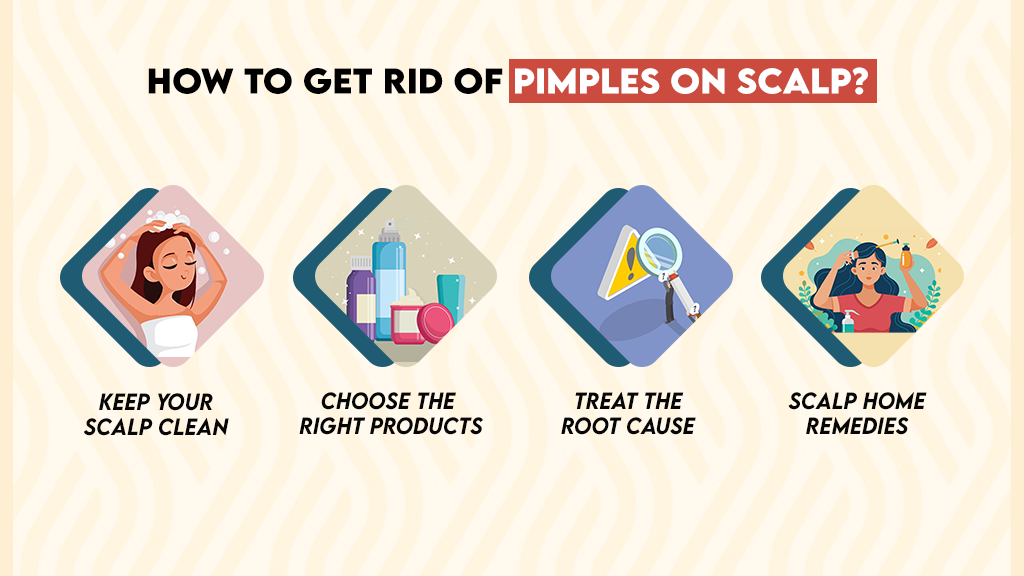
If you are wondering how to treat pimples on scalp, there isn’t a one-size-fits-all answer. It all depends on the root cause and severity of the conditions. Some cases clear up with a medicated shampoo, while others may require a combination of self-care and prescription medication.
Here are a few things that you can do to prevent the condition from getting worse.
1. Keep your Scalp Clean
The build-up of sebum, dirt, and bacteria on the scalp can further clog the pores and make the condition worse.
- Keep the scalp clean with a mild non-comedogenic daily shampoo.
- Shampoo your scalp at least 3 times a week.
- If you have an excessively oily scalp, then you can also shampoo your hair daily to prevent the buildup.
The best shampoo for pimples on scalp is considered the one that contains any of the following active ingredients:
- Salicylic acid
- Ketoconazole
- Glycolic acid
- Ciclopirox
- Benzoyl peroxide
Sometimes dandruff shampoo containing zinc pyrithione, selenium sulfide, and coal tar is also prescribed to manage the pimples on scalp, depending on the cause of the condition.
2. Choose the Right Products
Keeping the scalp clean is essential, but using the right products to keep it clean and healthy is also important.
- Avoid products with fragrances, parabens, and sulfates.
- Stick to oil-free, non-comedogenic, hypoallergenic products.
3. Treat the Root Cause
Diagnosing the root cause of the pimples on the scalp is essential to get the right treatment plan. The best way to do so is to consult a dermatologist who will be able to rule out the underlying skin condition and provide you with a treatment plan according to it.
Once you treat the underlying skin condition, you will notice that the pimples on your scalp will also start getting better.
4. Scalp Home Remedies
There are a few things that you can do at home to care for your scalp and support the healing process.
- Avoid using hair products that contain oil.
- Thoroughly rinse your scalp after shampooing to prevent any residue buildup.
- Wash your hair regularly, especially after you sweat.
- Avoid wearing tight headgear, hats, or headbands.
- Avoid shaving the scalp.
- Avoid using hair styling products that contain harsh chemicals.
- Avoid scratching or popping the pimples.
- Use a cold compress to relieve the severe itching temporarily.
- Brush your hair gently to prevent the condition from getting worse and causing hair loss.
Manage Seborrheic Dermatitis With Happy Cappy
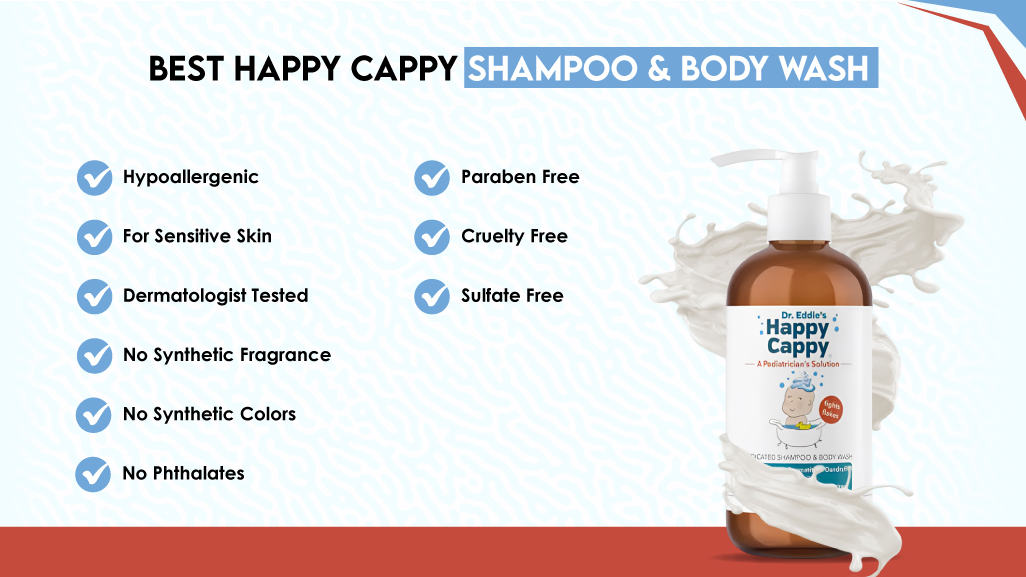
If you are dealing with seborrheic dermatitis or your child is experiencing cradle cap. Then try using Happy Cappy Products.
- Happy Cappy anti-seborrheic dermatitis shampoo is specially developed by a pediatrician to prevent the recurrence of itching, irritation, and scaling of the scalp and skin associated with seborrheic dermatitis.
- Happy Cappy Cradle Cap Shampoo is one of the first medicated shampoos that is specially developed for the delicate and sensitive skin of babies.
Both of these shampoos are fragrance-free, sulfate-free, paraben-free, and dimethicone-free and contain pyrithione zinc as an active ingredient. Pyrithione zinc has been used for decades to manage the symptoms associated with dandruff, seborrheic dermatitis, and cradle cap.
They also contain skin-soothing natural ingredients like licorice root extract and apple fruit extract that will help leave your scalp healthy and flake-free.
Conclusion
Pimples on scalp can be uncomfortable and sometimes painful, but understanding the cause is the key to proper treatment. Conditions such as scalp acne, folliculitis, seborrheic dermatitis, psoriasis, ringworm, AKN, and even skin cancer can all appear as scalp bumps.
Keeping the scalp clean, choosing the right products, treating underlying conditions, and seeking medical care when necessary can help keep your scalp healthy and clear.
FAQs
Why do I keep getting pimples on my scalp?
The main cause of pimples on scalp is clogged hair follicles. They can be clogged due to product buildup, the presence of certain bacteria, or excess sebum on the scalp.
However, other skin conditions such as
scalp folliculitis
seborrheic dermatitis
Ringworm
acne keloidalis nuchae
also leads to the appearance of pimple-like bumps on the scalp.
If you notice that your pimples are persistent or recurring, then it is best to consult a dermatologist because they can also be a sign of skin cancer
When should I be worried about bumps on my scalp?
If the bump or pimple on your scalp lasts for a long period of time or starts getting worse, becomes sore, and oozes fluid, then immediately consult the doctor.
How can I get rid of pimples on my scalp?
The best way to get rid of pimples on the scalp is to use a medicated shampoo at least 2 to 3 times a week to wash your scalp. Use a shampoo that contains Salicylic acid as an active ingredient.
How long do scalp pimples last?
It depends on the root cause and severity of the condition. Mild cases of scalp acne usually take about a few weeks to get better with the right treatment. While pimples caused by any other skin condition may take a little longer to get better.
What shampoo is good for scalp folliculitis?
For scalp folliculitis, the doctor usually prescribes the use of OTC medicated anti-fungal shampoo containing ketoconazole or ciclopirox as an active ingredient to treat the condition.
Is it ok to pop pimples on head?
No, it is not ok to pop pimples on your scalp. Popping or scratching the pimples can lead to other complications such as:
Scarring
Skin infection
Increased inflammation
Severe pain
